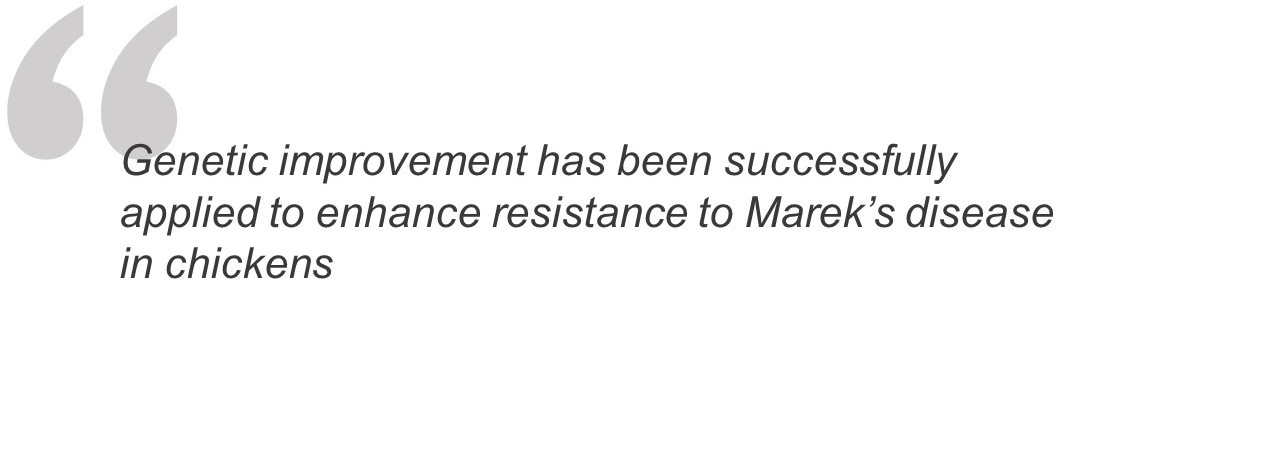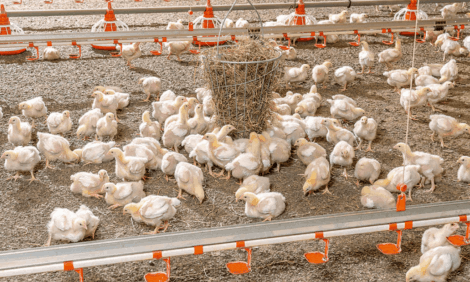



Advanced genetics and genomics tackle constraints on smallholder poultry production
New innovation and technologies will result in vaccines becoming even more efficient and playing a greater role in disease preventionWords Feed the Future Innovation Lab GIP

Local village chickens are an important resource benefiting food security and the livelihoods of impoverished people in less developed countries. Poultry eggs and meat provide high-quality protein and micro- and macronutrients, which are vital for preventing cognitive and growth delays in malnourished children. Chickens can also generate income for which women and children are the major beneficiaries, and therefore village birds meet essential household needs such as education and healthcare.
Village poultry production is a low-input system requiring little investment, thereby offering farmers security against financial risk. This is especially important given our rapidly changing world with growing human populations, changes in land-use, and increasingly unpredictable weather patterns. Local chickens also play an important socio-cultural role in traditional ceremonies and gift-giving.
Currently, the most substantial challenge for smallholder poultry producers is Newcastle disease (ND). Newcastle disease, which is caused by a highly contagious virus, threatens poultry populations worldwide and is endemic in many developing countries. Highly pathogenic strains of the virus can result in 100 percent mortality in affected flocks and have significant economic impacts as a result of trade restrictions. Vaccination is one of most effective approaches in preventing ND outbreaks. However, it is very difficult to implement sustainable ND vaccination programmes in Africa, especially in rural areas with inadequate agricultural extension services, limitations to maintaining a “cold chain” - refrigeration at all stages of the transportation process - to keep the vaccine viable and unreliable production and distribution.

Biosecurity measures are also extremely important in disease prevention and control, but are challenging to put in place in these systems, in which chickens from multiple households are free-ranging and comingling with other chickens and wild birds. In addition to ND, heat stress limits poultry production in less developed countries. Elevated temperatures and heat waves stress chickens, resulting in lower feed intake, reduced productivity and mortality. Feed additives can reduce the impact of heat. However, these products are not readily accessible in rural areas.
Genetic selection for enhanced resistance to ND and heat stress offers a promising complementary approach to addressing these constraints. Chickens each have about 1 billion DNA base pairs that control their genetics. With recent technical advances, the chicken’s genetic code can be studied in detail. Genetic variation among chickens accounts for differences in disease resistance and heat tolerance, thereby allowing for genetic improvement of targeted traits. For example, genetic improvement has been successfully applied to enhance resistance to Marek’s disease in chickens. Selected lines demonstrated significantly higher survival compared to standard lines under Marek’s disease virus challenges. Disease resistance and heat tolerance are both complex traits meaning that hundreds or even thousands of differences in the genetic code contribute to genetic improvement, each having a very small effect.
The Feed the Future Innovation Lab for Genomics to Improve Poultry (GIP), which is led by UC Davis in collaboration with Iowa State University, Sokoine University of Agriculture in Tanzania (SUA), the University of Ghana (UoG) and the University of Delaware, is applying cutting-edge genomics technology to identify natural genetic variations associated with ND resistance and heat tolerance in diverse indigenous African ecotypes and in well-characterised chicken experimental genetic populations.
.png)
The Innovation Lab has established poultry models for evaluating resistance to heat stress and Newcastle disease virus (NDV). Using these models, the Innovation Lab has identified several genes, biomarkers, and genetic pathways associated with heat resilience and NDV resistance. Our results show that viral load (quantity of virus in tears), and antibody level against NDV could be important indicators of the chicken’s resistance to NDV. Heritability of these traits in African indigenous chickens is moderately high, suggesting that using these traits in a selective breeding programme to improve the chickens’ resistance to NDV and heat stress is feasible and promising. The Innovation Lab is currently developing an economic diagnostic tool with genetic markers and associated biomarkers to use in the subsequent breeding programme to enhance NDV and heat resistance.
In addition to improving US lines, this genetic diagnostic platform will be applied to low-input production systems in Africa, where disease resistance in indigenous chickens is particularly important. Genomics to Improve Poultry investigators are engaging with smallholder farmers and other stakeholders from the public and private sectors in Tanzania and Ghana who are interested in African indigenous poultry production to better understand the vital actors in the poultry value chain. This information will inform the most effective means for sustainable breeding and distribution programmes for the genetically improved lines.
Capacity enhancement has been a key component of the GIP programme. Renovations of poultry breeding and animal-trial facilities at SUA and the UoG have provided critical infrastructure for further poultry research investigations. Training of staff, faculty and students at these institutions on biosecurity, poultry handling, sample collection, molecular laboratory procedures and advanced genetic tools and data analysis is building the local workforce needed to sustainably improve poultry production systems in Africa. Contemporary genomics, coupled with education, training and outreach, will enable innovation and the development of the enhanced technology needed to achieve maximum productivity for smallholder poultry farmers in Africa.
Special thanks to the Feed the Future Innovation Lab GIP team for their contributions:
Huaijun Zhou, Susan Lamont, Jack Dekkers, Amandus Muhairwa, Boniface Kayang, Augustine Naazie, George Aning, Peter Msoffe, Rodrigo Gallardo, Terra Kelly, David Bunn, Esinam Amuzu-Aweh, Muhammed Walugembe, Ying Wang, Perot Saelao, Melissa Deist, Kaylee Rowland, James Salakana, Princess Botchway, Gaspar Honorati, George Makingi, and Carl Schmidt
This article was originally published in the March 2018 edition of Poultry Digital Magainze











